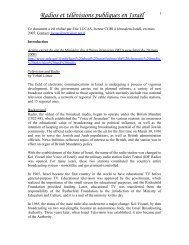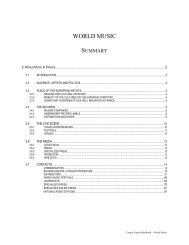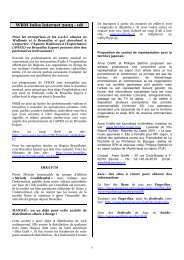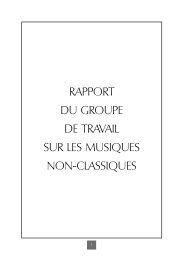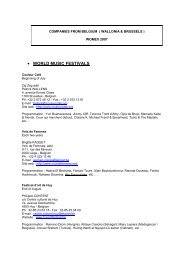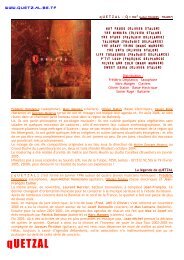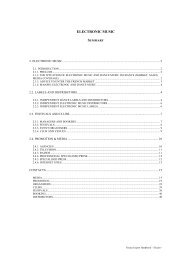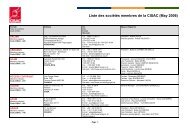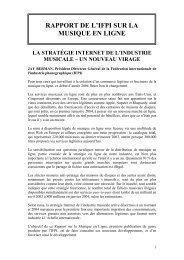Create successful ePaper yourself
Turn your PDF publications into a flip-book with our unique Google optimized e-Paper software.
IFPI DIGITAL MUSIC REPORT 2009New frontiers: games, brands and merchandising.As the music business evolves awayfrom a single format environment to oneof multiple channels for monetising musicnew opportunities and revenue streams areemerging. Synchronisation (the use of music infilms, adverts and games), brand partnerships,merchandising and performance rightsincome are key areas of music licensing.Generating value from the links betweenartists and brands is a key area of focusfor music companies. In 2008 Sony MusicEntertainment teamed up with communicationsagency Exposure to launch a pan-Europeancreative agency called SBX that will developmarketing partnerships between musicartists and brands. “Our job is to match theright artist with the right brand for the rightcampaign,” says Richard Story, chief operatingofficer of Sony Music Continental Europe.Companies have introduced specialisedsynchronisation departments as the sectorbecomes more sophisticated and its revenuesgrow. In some markets synchronisation helpsbreak new acts. In Germany, Deutsche Telecomran online adverts taking footage from theTV talent show Britain’s Got Talent whichfeatured the artist Paul Potts. They used it asan inspirational story and it connected withfans. Paul Potts went on to sell more than800,000 albums in Germany in the followingsix months. Paolo Nutini, signed to WarnerMusic, featured in PUMA’s global ‘Sportlifestyle’campaign performing his track New Shoes.Additional and exclusive content was used toextend the campaign into the online space.“Games are an increasingly popular wayfor new acts to reach new audiences.As the games get more sophisticated,the opportunities for in-gameadvertising, product placement andpersonalisation of the experience willincrease. The possibilities are endless.”Greg Turner, Creative LicensingManager, Film & ComputerGames, Universal Music UKMusic boosts the games sectorAs the games sector rapidly changes withnew technology, it is becoming an increasinglysignificant source of demand for music. Thegames industry globally was worth an estimatedUS$48.3 billion in 2008 and is projectedto grow to US$68.3 billion by 2012 (PWC,Global Entertainment and Media Outlook).The use of music is driving a significantproportion of that revenue. A report byNPD Group noted that music games wereresponsible for 15 per cent of all games salesin the first half of 2008 and 32 per cent of theindustry’s year-on-year growth in the US. Theoriginal Guitar Hero and its sequels have soldmore than 23 million copies across all platformsin less than three years (Reuters), grossing morethan US$1 billion in North America alone (PWC).Universal Music UK reports that synchronisationrevenue from games has now overtaken thatfrom films and is second only to advertising.Greg Turner, creative licensing manager forfilm and computer games at Universal MusicUK, says: “Many younger bands who havegrown up in the games culture ask their labelif their music can be played on games. Theyplay interactive games themselves and agame console is an essential part of the tourbus.” Titles such as Rock Band and GuitarHero also offer music downloads through thegame console – and gamers have proven tohave a healthy appetite for premium musicdownloads. Microsoft reported sales of 3.8million songs a month through Xbox Live,which includes downloads from both games.Music games wereresponsible for 15 percent of all games salesin the first half of 2008and 32 per cent of theindustry’s year-on-yeargrowth (NPD Group).Many artists have been receptive to releasingmusic through video games. In 2008 Metallicareleased their latest album Death Magneticas a game premium download on the sameday as the general release of the album.Mötley Crüe released the single Saints of LosAngeles through Rock Band as a downloadon the same day as its commercial release.The single generated 50,000 sales through thegame, compared to 14,000 downloads fromiTunes during its first week of release. It wasannounced in late 2008 that The Beatles willbe making their catalogue available digitallyfor the first time through a video game inpartnership with EMI Music and Harmonix.The music-games partnership has greatpotential, but raises concerns over the fairvaluation of the music being licensed. FrancisKeeling commercial director, digital, UniversalMusic Group International says music ishelping drive the games market: “Peopleconsume music in different ways. Music fanslove interactive experiences like Guitar Heroand Singstar and as people are more likelyto stay at home in an economic downturn,the popularity of such platforms could grow.But there needs to be a fair partnership thatrecognises that it is music that makes peoplewant to play these games in the first place.”Merchandising – towardsan integrated approachMusic companies are increasingly sellingbundles of products; combining digitaldownloads with merchandising or live ticketsto create what is in effect an “unpiratable”product. Labels have become more involved inselling artist merchandise, either by acquiringspecialist firms or by partnering with existingsuppliers. Traditionally, merchandisingproduct was placed separately in retaildisplay areas with no link to recorded music12



